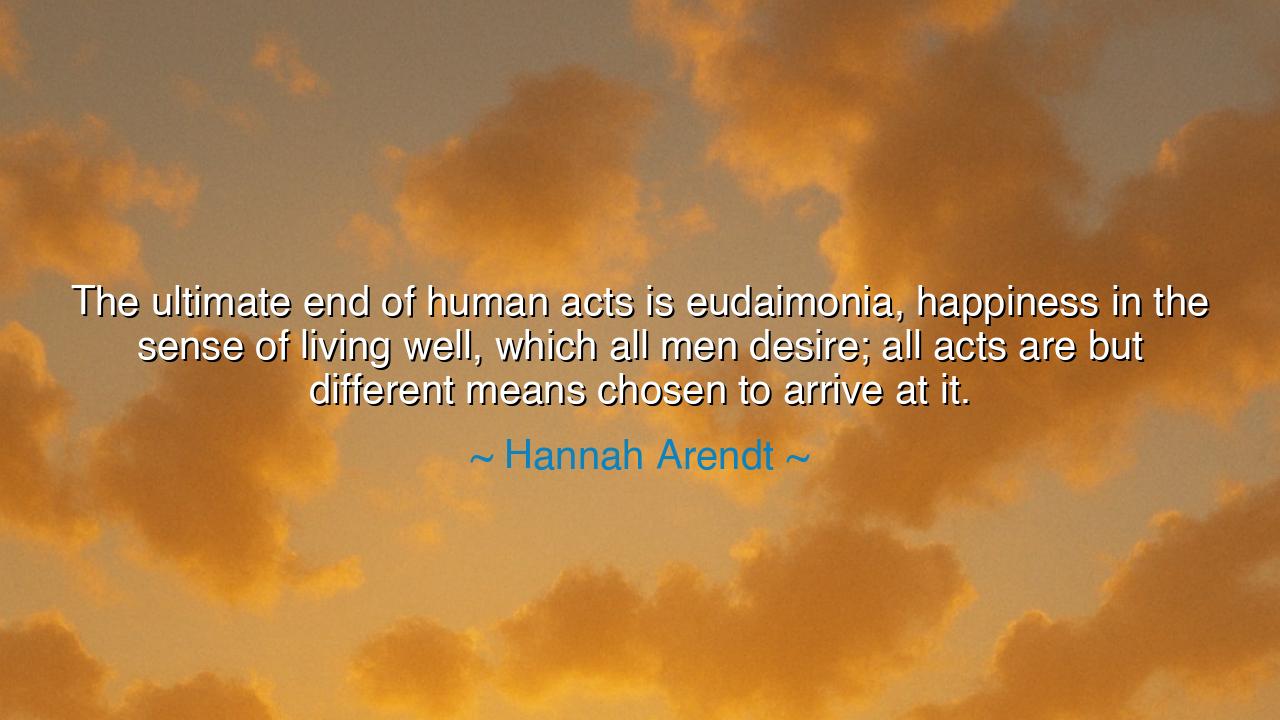
The ultimate end of human acts is eudaimonia, happiness in the
The ultimate end of human acts is eudaimonia, happiness in the sense of living well, which all men desire; all acts are but different means chosen to arrive at it.






The philosopher Hannah Arendt, inheritor of the ancient spirit of inquiry, once wrote: “The ultimate end of human acts is eudaimonia, happiness in the sense of living well, which all men desire; all acts are but different means chosen to arrive at it.” In these timeless words, she touches the very root of human striving—the quest for eudaimonia, a word that the Greeks held sacred. It does not mean mere pleasure or fleeting joy, but happiness as the fulfillment of one’s being, the harmony between what one does and what one is. Arendt reminds us that every action, every choice, whether noble or ignoble, is driven by this same yearning—to live well, to live fully, to live in accordance with what the soul was made to be.
The meaning of her words is both simple and profound. All human acts—whether to build, to love, to learn, to conquer, or to create—are expressions of a deeper hunger: the desire for wholeness. Each person, knowingly or not, seeks a state where the mind is at peace, the heart is unconflicted, and life unfolds in purpose. Yet the ways we pursue this state differ, and often lead us astray. One seeks wealth thinking it will bring contentment, another seeks power for security, another seeks knowledge for truth. But these are only the means—the instruments of our yearning. The end, as Arendt reminds us, is not these outer attainments, but the inner state of living well—to be in right relationship with oneself, with others, and with the world.
The origin of this thought lies deep in the soil of Greek philosophy, most clearly in Aristotle, whose teaching of eudaimonia shaped centuries of ethical reflection. For Aristotle, happiness was not a passive feeling but an activity of the soul in accordance with virtue. It was not to be found in indulgence, nor in mere success, but in living a life guided by excellence of character. Arendt, inheriting this wisdom and reinterpreting it through the lens of the modern age, saw that even in a world of machines, ideologies, and wars, the ancient yearning for eudaimonia still burned within the human heart. The means had multiplied—commerce, science, politics—but the end remained unchanged: to live a life that feels true, complete, and meaningful.
History offers countless mirrors of this truth. Consider Socrates, the wise man of Athens, who could have escaped death by denying his philosophy but chose instead to die for the truth. He acted not for wealth, nor fame, nor power, but for the sake of living well—to remain in harmony with his conscience. In his final hours, as he drank the hemlock with serenity, he proved that happiness is not comfort, but integrity. His life was the embodiment of Arendt’s words: all acts, whether teaching in the marketplace or accepting death with grace, were means to the same sacred end—eudaimonia, the flourishing of the soul through virtue.
Yet in the modern age, this ancient wisdom is often forgotten. We live amid the noise of ambition, mistaking movement for meaning, wealth for worth, and pleasure for peace. Arendt warns us that without clarity of purpose, our actions become scattered, and our lives fragmented. We chase a thousand desires, but none lead us home. The path to eudaimonia requires reflection, discipline, and self-knowledge. It calls us to ask: “What is the good life for me—not as the world defines it, but as my soul yearns for it?” Only then do our actions gain coherence, for they flow from an inner order rather than outer chaos.
To live in pursuit of eudaimonia is to live with intention. It is to recognize that every act, however small, shapes the person you are becoming. A kind word, an honest deed, the daily cultivation of patience or gratitude—these are the bricks that build a life of meaning. As Arendt and Aristotle both understood, happiness is not granted by the gods nor bought by fortune; it is earned through the steady practice of living rightly. Each choice is a seed, and every moment an opportunity to plant the garden of your soul.
The lesson is clear: do not seek happiness as a possession, but as a way of being. Align your actions with your highest values. Let your work, your relationships, your words, and your thoughts reflect your true nature. When you fail, reflect; when you succeed, stay humble; when you doubt, return to the question: “Is this helping me to live well?” For in the end, as Hannah Arendt reminds us, all human acts—whether grand or ordinary—are but steps along the same eternal road. And when that road is walked with integrity, courage, and love, it leads not merely to happiness, but to the completion of the soul, which is the truest victory of life itself.






AAdministratorAdministrator
Welcome, honored guests. Please leave a comment, we will respond soon